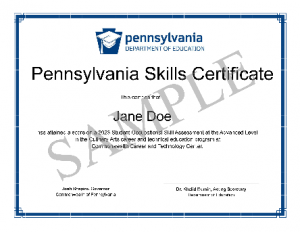The views, opinions, services and products shared in this post are solely for educational purposes and do not imply agreement or endorsement by Advance CTE, nor discrimination against similar brands, products or services not mentioned.
 In the ever-evolving landscape of workforce education and the development of tomorrow’s workforce, high-quality Career Technical Education (CTE) programs and prepared graduates remain indispensable. Positioned to enrich the nation’s workforce pipeline with highly skilled individuals, CTE systems are essential contributors to economic growth.
In the ever-evolving landscape of workforce education and the development of tomorrow’s workforce, high-quality Career Technical Education (CTE) programs and prepared graduates remain indispensable. Positioned to enrich the nation’s workforce pipeline with highly skilled individuals, CTE systems are essential contributors to economic growth.
State CTE leaders set direction, make decisions aligned to their mission, and create value for learners and employers. There is a unique opportunity to establish benchmarks for defining high-quality CTE systems and that involves a continuous commitment to assessing inputs and outputs, recognizing assessment’s role in ensuring quality outcomes.
For over 55 years, NOCTI/Nocti Business Solutions (NBS) has been dedicated to CTE by developing reliable processes, resources, and research support to strengthen the role of assessments in CTE programs. This commitment highlights the significance of third-party skills verification as a fundamental practice in high-quality CTE systems. Utilizing data-driven quality assessment promotes continuous improvement and boosts leaders’ confidence.
Here are three benefits of implementing quality assessment practices to propel CTE programs forward and assist CTE leaders in contributing economic value across their states.
Benefit #1: Gain confidence in preparing learners for workplace readiness.
 State CTE leaders utilize data as feedback to continuously improve systems, celebrate high-quality programs, and target areas for improvement. For example, the Pennsylvania Department of Education (PDE) utilizes NOCTI/NBS assessments and data for various purposes, including program evaluation, curriculum alignment, instructional improvement, professional development, and accountability. Learners meeting state-established benchmarks are eligible for the Pennsylvania Skills Certificate (PSC), recognizing individual advanced technical skill achievement.
State CTE leaders utilize data as feedback to continuously improve systems, celebrate high-quality programs, and target areas for improvement. For example, the Pennsylvania Department of Education (PDE) utilizes NOCTI/NBS assessments and data for various purposes, including program evaluation, curriculum alignment, instructional improvement, professional development, and accountability. Learners meeting state-established benchmarks are eligible for the Pennsylvania Skills Certificate (PSC), recognizing individual advanced technical skill achievement.
Benefit #2: Engage industry partners through authentic approaches.
 High-quality CTE systems involve business/industry partners in verifying skills, ensuring learner assessments accurately reflect expertise. This practice not only benefits learners but also provides industry employees with an opportunity to contribute meaningfully to CTE schools and programs. As one evaluator recently summarized, “I am always willing to set time aside to work with these learners and programs, as this is the future of my industry–one that I care about and want to impact.”
High-quality CTE systems involve business/industry partners in verifying skills, ensuring learner assessments accurately reflect expertise. This practice not only benefits learners but also provides industry employees with an opportunity to contribute meaningfully to CTE schools and programs. As one evaluator recently summarized, “I am always willing to set time aside to work with these learners and programs, as this is the future of my industry–one that I care about and want to impact.”
Benefit #3: Recognize CTE learners in ways that honor skill development.
Recognition of learning progress motivates learners, contributing to their confidence and expertise. NOCTI/NBS certifications offer third-party validated credentials aligned with industry standards. CTE teachers receive affirmation of their instructional impact on learners, validating program quality across various learning contexts. Continuous improvement and collaboration with industry partners enable CTE leaders to create meaningful opportunities for learners to thrive in their chosen fields.
CTE programs shape the future workforce, providing essential skills for success. Implementing NOCTI/NBS assessments ensures learners are prepared for workforce demands and their accomplishments are recognized. Contact NOCTI/NBS to learn more about national certifications and options to integrate NOCTI/NBS products and services into CTE state assessment systems. Join our Subject Matter Expert network!
Kathleen McNally, NOCTI/NBS CEO


 It has been said that: 1) innovation survives when people believe in ideas; 2) an idea that survives is one that creatively solves a problem; and 3) a great idea is one that survives over time. By these metrics Career Technical Education (CTE) is clearly a great idea, evidenced by the federal funding that supports it, allowing states to establish their own CTE delivery system that leads to learner success in a career of their choice. This has resulted in 50+ versions of what a high-quality CTE program looks like.
It has been said that: 1) innovation survives when people believe in ideas; 2) an idea that survives is one that creatively solves a problem; and 3) a great idea is one that survives over time. By these metrics Career Technical Education (CTE) is clearly a great idea, evidenced by the federal funding that supports it, allowing states to establish their own CTE delivery system that leads to learner success in a career of their choice. This has resulted in 50+ versions of what a high-quality CTE program looks like. 